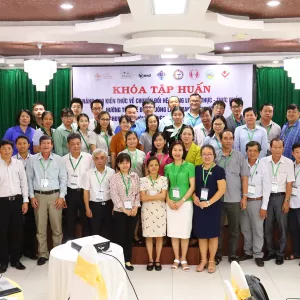Catalyzing food systems transformation across Viet Nam through capacity development: training workshops in Dong Thap and Son La Provinces
Across Viet Nam, local leaders are taking an active role in implementing the country’s National Action Plan on Food Systems Transformation (NAP-FST). Organized by Vietnamese institutions with support from the CGIAR Research Initiative on Sustainable Healthy Diets through Food Systems Transformation (SHiFT), recent training workshops in Son La and Dong Thap provinces empowered stakeholders with practical tools to address local

Catalyzing food systems transformation across Viet Nam through capacity development: training workshops in Dong Thap and Son La Provinces
Across Viet Nam, local leaders are taking an active role in implementing the country’s National Action Plan on Food Systems Transformation (NAP-FST). Organized by Vietnamese institutions with support from the CGIAR Research Initiative on Sustainable Healthy Diets through Food Systems Transformation (SHiFT), recent training workshops in Son La and Dong Thap provinces empowered stakeholders with practical tools to address local challenges while contributing to national and sub-national progress toward sustainable food systems transformation.
Training materials for both workshops were informed by expert consultations as part of SHiFT’s training of trainers (ToT) program in Viet Nam. Focusing on capacity development and collaboration, the ToT program engages local partners to develop context-specific food systems solutions for sustainable healthy diets.
Strengthening capacity in Dong Thap Province
The first training workshop took place on August 8-9, 2024, in Cao Lanh City, Dong Thap Province, drawing more than 50 representatives from government departments, NGOs, and educational institutions. Co-hosted by Can Tho University, the Alliance of Bioversity International and CIAT (the Alliance), Wageningen University and Research (WUR), the Department of Agriculture and Rural Development (DARD) of Dong Thap Province, the Vietnam Academy of Agricultural Sciences (VAAS), the National Institute of Nutrition (NIN), and the Institute of Policy and Strategy for Agricultural and Rural Development (IPSARD), the two-day training focused on promoting food systems transformation towards sustainable healthy diets.
The workshop provided an overview of the NAP-FST, exploring concepts in food systems transformation, sustainable healthy diets, and agroecological transition. Participants gained an in-depth understanding of local food systems, learning about key actors and strategies for addressing current challenges. To apply theoretical insights to practical settings, the program included a visit to My Phu Market, offering a first-hand look at the local food system, provision of healthy foods, and the multi-stakeholder roles required for sustainable development.

Empowering local leaders in Son La Province
Building on the momentum from Dong Thap, a second workshop was held on September 18-19, 2024, in Moc Chau District, Son La Province. The workshop was organized by the Center for Agrarian Systems Research and Development (CASRAD), the Alliance, WUR, the DARD of Son La Province, VAAS, NIN, IPSARD, and the Moc Chau District People’s Committee. More than 30 stakeholders from both the provincial and district levels participated in the two-day training on food systems transformation and sustainable healthy diets.
The program featured interactive activities where participants analyzed food system components, discussed trade-offs, and considered synergies specific to Son La Province. Challenges related to the accessibility of healthy foods and shifting consumer behavior toward healthier diets were central points of discussion. A highlight of the workshop was a field visit to Km70 Market and Mocha Hill Agroecology Tourism model, where participants observed agroecological practices, indigenous crops, local cuisine, and tourism, identifying leverage points to advance food systems goals.
Results from a pre- and post-training survey revealed improvements in participants’ understanding of agroecology and food systems transformation. Participants expressed that the knowledge and skills gained during the training were applicable to their daily work.

Continuing the journey toward sustainable food systems
As the first comprehensive provincial-level activities related to the NAP-FST, these workshops reflect a commitment to advance Viet Nam’s journey toward food systems that deliver sustainable healthy diets. Both Dong Thap and Son La Provinces have established technical working groups to maintain this momentum. In collaboration with the Ministry of Agriculture and Rural Development (MARD), these groups will focus on implementing priority actions and ensuring continued alignment with Viet Nam’s national food systems transformation goals.
The provincial-level workshops are part of a growing set of collaborative capacity sharing and policy engagement activities SHiFT and national partners are implementing in Viet Nam. The most recent activities include an ambitious rollout of the ToT program, the 1st International Conference on Green Transformation, and a small grant scheme for master’s level students.
Header image: Group photo of workshop participants in Dong Thap Province, Dr. Ho Hong Lien, Can Tho University.
The International Food Policy Research Institute and the Alliance of Bioversity International and CIAT lead SHiFT in close collaboration with Wageningen University and Researchand with contributions from the International Potato Center. SHiFT combines high-quality nutritional and social science research capacity with development partnerships to generate innovative, robust solutions that contribute to healthier, more sustainable dietary choices and consumption of sustainable healthy diets. It builds on CGIAR’s unparalleled track record of agricultural research for development, including ten years of work on food systems and nutrition under the CGIAR Research Program on Agriculture for Nutrition and Health

